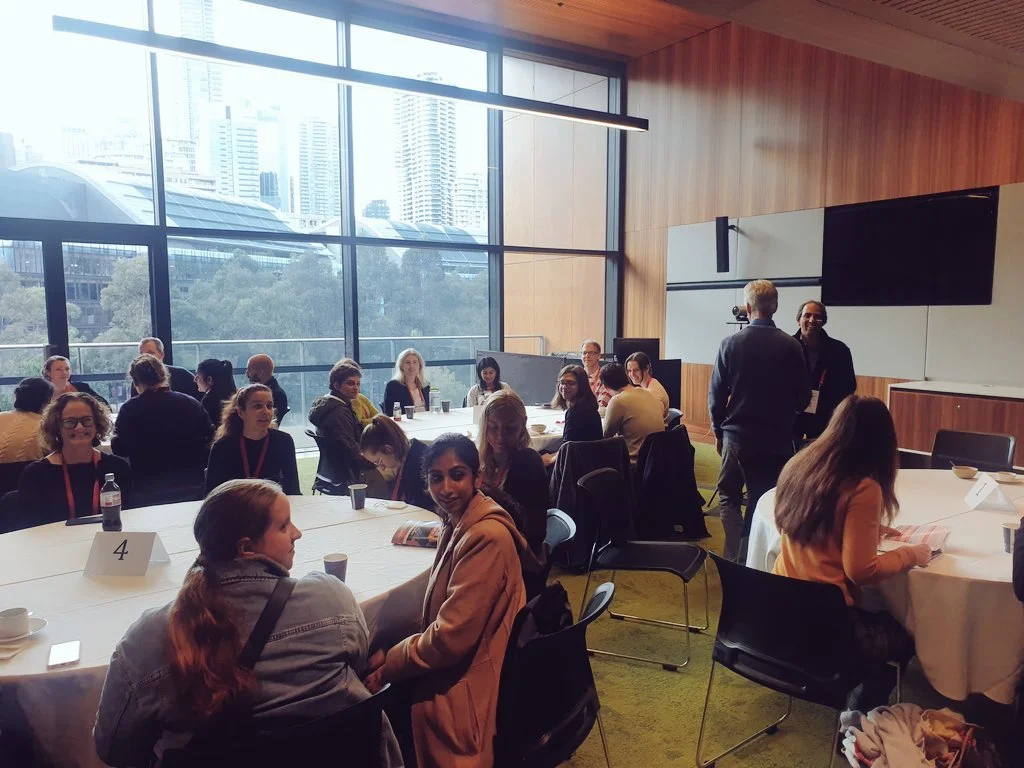ASM 2022 Nancy Millis Breakfast
+ Nancy Millis Breakfast at ASM 2022
Our communications ambassador Aditi Aiyer (PhD candidate, Infectious Diseases and Immunology, The University of Sydney) shares her experience from the Nancy Millis breakfast.
For early career researchers, Day 2 of the Australian Society of Microbiology 2022 conference meant a very chilly, very early morning at the ICC Darling Harbour. Young researchers gathered from across Australia to foster new connections, eat croissants and, most importantly, have our morning coffees (although our caffeination briefly hung in the balance as the machine malfunctioned upon our arrival).
The eponymous breakfast was a request by the late Nancy Millis, an Australian microbiologist who not only brought fermentation technology to Australia but also believed in dedicating her time to students and their progress through academia.
In that spirit, the 2022 ASM Nancy Millis Breakfast gave ECRs the opportunity to rub shoulders with some of this year’s plenary speakers and gain insights on how they progressed. I was fortunate to attend and speak with Professor Ian Paulsen, a microbial genomics researcher from Macquarie University, who regaled us with tales from his undergraduate, PhD, fellowship and academic years. From each of his stories emerged a valuable lesson on how to navigate academia and beyond:
1. Make time for yourself, you are more than your research
To break the ice, and prompted by Ian’s comment on how he likes to relax and play video games on the weekend, our group decided that maybe it was best to not introduce ourselves with our research but who we are outside of it. What we discovered is that our talented group were surfers, rock climbers, sewing and knitting fashionistas, pottery experts, MasterChefs and even cross-country motor bikers. By the end of it all, we realised that we are more than our research and it is our hobbies that keep us afloat and keep us human - giving us a much-needed respite from the throes of research.
2. Push yourself, your passion will drive you
One thing that really stood out from Ian’s story is that when he started as a wee undergraduate - he had a passion for chemistry. Yes, the renowned microbial genomics ARC Laureate fellow started off his university career with his heart fairly set on chemistry…. until, one day, he wanted to take on microbiology.
“It seemed cool”; he said.
It was from there that he considered honours in microbiology and his passion was “cultured”. This taught us the valuable lesson that we need to push ourselves out of our comfort zones and try new things and who knows, it may unlock a hidden passion that will drive us into the future.
3. Always have a backup plan though and never burn your bridges
During one of Ian’s fellowships, he realised that he was not as passionate as he once thought he was with his project. And so, he followed his passions and left this well-funded fellowship.
“But!”; he quickly added, “make sure you have a backup though!”.
This holds very true. While it may be something that a lot of us may intuit when moving from one opportunity to another it is still important to highlight that not only can your passion for a project fade (just as quickly as it emerged), but that it is okay for it to happen. All you need is a backup plan before you make any rash decisions.
4. Always look on the bright side of life, even when it doesn’t seem like it.
One question that we asked was “what was your best day in the lab, and your worst”. And Ian’s answers had us in stitches. His best day was probably his first day as an honours student - mainly because his experiments have never worked as well as they did since that first week (something all of us found incredibly hard to believe).
But his worst day was one that we really did not see coming - he had to deal with a massive radioactivity breakout in his lab. He recalls that it was one of the worst ever recorded leak in the history of the institution; where one of the worst ones resulted in the building being sealed up for decades! Even though he was met with our faces aghast and in shock he still had a smile on his face. And honestly, that’s something that we all need to learn from. Even on our worst days, we cannot allow all the negativity to bring us down. In short, it may be awful in the moment but make sure you can try to laugh about it at some point in the future.
We have been so lucky to have this opportunity to not only meet new friends, networking in person but also learn about how the amazing and successful academics became who they are today.
Twitter: @AiyerDidi

